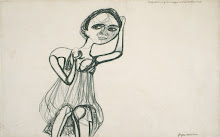From The Invention of Solitude, Paul Auster:
He ate, he went to work, he had friends, he played tennis, and yet for all that he was not there. In the deepest, most unalterable sense, he was an invisible man. Invisible to others, and most likely invisible to himself as well . . . he had lived alone. Doggedly, opaquely, as if immune to the world. He did not seem to be a man occupying space, but rather a block of impenetrable space in the form of a man. The world bounced off him, shattered against him, at times adhered to him—but it never got through.
Talking to him was a trying experience. Either he would be absent, as he usually was, or he would assault you with brittle jocularity, which was merely another form of absence. It was like trying to make yourself understood by a senile old man . . . I would find myself saying more than I normally do, becoming aggressively talkative, chatting away in a futile attempt to hold his attention, to provoke a response. Afterwards, I would invariably feel foolish for having tried so hard.
In spite of the excuses I have made for myself, I understand what is happening. The closer I come to the end of what I am able to say, the more reluctant I am to say anything. I want to postpone the moment of ending, and in this way delude myself into thinking that I have only just begun, the better part of my story still lies ahead. No matter how useless these words might seem to be, they have nevertheless stood between me and a silence that continues to terrify me.
A Girl Called Eddy – The Long Goodbye (mp3)
skip to main |
skip to sidebar
"Music is a mediator between spiritual and sensual life."
Blog Archive
-
▼
2006
(255)
-
▼
March
(16)
- between good enough and bored stiff
- small sacrifices
- corpse of wednesday
- Not the person who could not read and write would ...
- theory + music
- ecstasy being more easily imagined than achieved
- self help reading + music
- m i c, k e y . .
- self help reading + music
- self help reading + music
- addiction theory
- end (of the week at least)
- who invented irony?
- reading + a song
- who will show up (or might not) + tunes
- self help reading
-
▼
March
(16)
